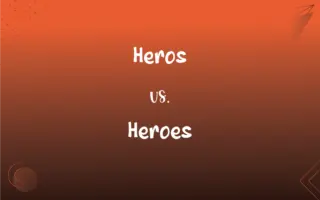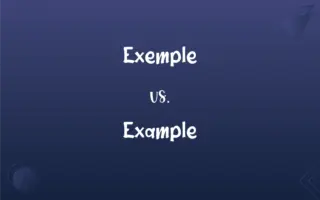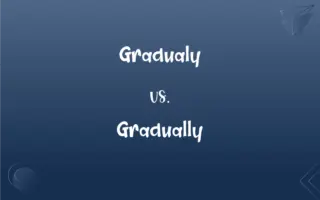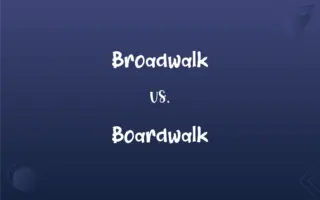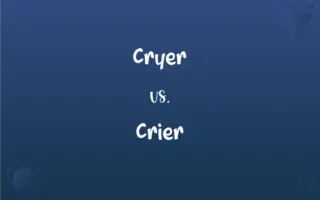Reffering vs. Referring: Mastering the Correct Spelling
Edited by Aimie Carlson || By Janet White || Updated on March 13, 2024
"Reffering" is an incorrect spelling; the correct spelling is "referring." Referring is the act of directing someone or something to a different place or person for information, help, or action.

Which is correct: Reffering or Referring
How to spell Referring?

Reffering is Incorrect

Referring is Correct
ADVERTISEMENT
Key Differences
Remember that the word "refer" has one 'r' and "referring" adds another, making it two 'r's.
Visualize a sign pointing ('referring') you to the right spelling with two 'r's.
Associate it with "reference," which starts with the same "ref-" prefix.
Think of "referee," which also has two "r's" in the middle.
Remember that "refer" doubles its "r" when adding "-ing."
ADVERTISEMENT
Correct usage of Referring
In the meeting, they were reffering to the financial report from last quarter.
In the meeting, they were referring to the financial report from last quarter.
He kept reffering to the manual for instructions.
He kept referring to the manual for instructions.
The teacher was reffering to the previous chapter in her lecture.
The teacher was referring to the previous chapter in her lecture.
The guide was reffering to the map to explain the route.
The guide was referring to the map to explain the route.
She was reffering to an article she read about health and diet.
She was referring to an article she read about health and diet.
Referring Definitions
To mention or allude to in speech or writing.
She was referring to a previous conversation.
To send or direct someone to a specialist or authority.
The doctor is referring her to a specialist.
To direct to a source for help or information
Referred her to a heart specialist.
Referred me to his last employer for a recommendation.
To submit (a matter in dispute) to an authority for arbitration, decision, or examination.
To direct the attention of
I refer you to the training manual.
To assign or attribute to; regard as originated by.
To assign to or regard as belonging within a particular kind or class
Referred the newly discovered partita to the 1600s.
To relate or pertain; concern
Questions referring to yesterday's lecture.
To serve as a descriptor or have as a denotation
The word chair refers to a piece of furniture.
To speak or write about something briefly or incidentally; make reference
Referred during our conversation to several books he was reading.
To turn one's attention, as in seeking information
Refer to a dictionary.
Present participle of refer
The act by which somebody or something is referred; a reference.
To direct attention to something or someone.
He is referring to the manual for guidance.
To relate or have a connection to something.
The term refers to a specific method.
To look at or check for information.
I am referring to my notes.
Referring Sentences
When referring to the experiment, the scientist cited several important findings.
She was referring to her favorite book when she quoted that famous line.
The brochure was referring to the hotel's new amenities and services.
During the debate, he was referring to statistics to support his argument.
When referring to historical events, accuracy is crucial.
The lawyer was referring to a precedent set by an earlier case during the trial.
In the recipe, it keeps referring to ingredients not listed in the beginning.
The tour guide was referring to landmarks that we would visit during the trip.
In his speech, the president was referring to the economic growth in the past year.
The manual keeps referring to diagrams that are not clearly labeled.
The article was referring to recent studies on climate change.
The teacher was referring to the rules outlined in the student handbook.
The documentary was referring to interviews with experts in the field.
The website was referring to FAQs for quick answers to common questions.
The lecture was referring to theories developed in the early 20th century.
When referring to the software manual, he found the solution to the error.
The advertisement was referring to a sale that starts next week.
The report was referring to data collected over the last five years.
In her email, she was referring to the attachment for more details.
The novel was referring to a fictional city that mirrored New York.
Referring Idioms & Phrases
Referring to the source
Going directly to the original or primary material for information or confirmation.
To understand the concept better, he was referring to the source of the study.
Referring back to square one
Returning to the starting point of a process or project because previous efforts failed or were incorrect.
After the error in the calculations was discovered, the team was referring back to square one.
Referring to the drawing board
Going back to the planning stage after a failure or setback.
The prototype didn't work, so it's time we were referring to the drawing board.
Referring to the stars
Looking up to role models or ideals for guidance or inspiration.
Aspiring athletes were referring to the stars of their sport for motivation.
Referring over one's shoulder
Checking for approval, guidance, or permission from someone before proceeding.
He often found himself referring over his shoulder, unsure of his own decisions without his mentor's input.
Referring by the book
Adhering strictly to the rules or guidelines.
The new manager was known for referring by the book in all her decisions.
Referring under one's breath
Mentioning or speaking about something quietly or privately, often out of dissatisfaction or to avoid being heard.
She was referring under her breath to the decision, clearly unhappy with the outcome.
Referring to the rulebook
Consulting the official or established guidelines or regulations.
Before making a decision, the committee was referring to the rulebook to ensure compliance.
Referring to the grapevine
Obtaining information informally or through rumors.
I heard about the company merger by referring to the grapevine.
Referring to thin air
Making a reference to something that doesn't have a clear source or basis.
His accusations seemed like they were referring to thin air, with no evidence to back them up.
FAQs
Why is it called referring?
It's called "referring" because it comes from the verb "refer," which means to direct attention or to send to a particular place or person for information or action.
Which vowel is used before referring?
The vowel 'e' is used before "referring."
What is the root word of referring?
"Refer."
What is the plural form of referring?
N/A, it's a verb.
What is the verb form of referring?
"Refer."
Which preposition is used with referring?
"To" as in "referring to."
Is referring a noun or adjective?
Verb.
What is the pronunciation of referring?
/rɪˈfɜrɪŋ/
Which conjunction is used with referring?
"And," "but," "or," depending on the context.
What is the singular form of referring?
Referring (it's a verb form, not a noun, so it doesn't have a singular or plural).
Which article is used with referring?
"The" or "a" can be used depending on the sentence.
Is the referring term a metaphor?
No.
How do we divide referring into syllables?
Re-fer-ring.
How many syllables are in referring?
Three syllables.
What is a stressed syllable in referring?
The second syllable, "fer."
What part of speech is referring?
Verb.
What is another term for referring?
Directing, pointing, mentioning.
What is the second form of referring?
"Referred."
Is referring a vowel or consonant?
Begins with a consonant ('R').
Is the word referring imperative?
It can be used in the imperative mood, e.g., "Refer to the manual."
What is the first form of referring?
"Refer."
Is referring a negative or positive word?
Neutral.
What is the third form of referring?
"Referred."
What is the opposite of referring?
Ignoring, overlooking.
Which determiner is used with referring?
"The" or "a," depending on the context.
How is referring used in a sentence?
"I was referring to the main point in my argument."
About Author
Written by
Janet WhiteJanet White has been an esteemed writer and blogger for Difference Wiki. Holding a Master's degree in Science and Medical Journalism from the prestigious Boston University, she has consistently demonstrated her expertise and passion for her field. When she's not immersed in her work, Janet relishes her time exercising, delving into a good book, and cherishing moments with friends and family.
Edited by
Aimie CarlsonAimie Carlson, holding a master's degree in English literature, is a fervent English language enthusiast. She lends her writing talents to Difference Wiki, a prominent website that specializes in comparisons, offering readers insightful analyses that both captivate and inform.

